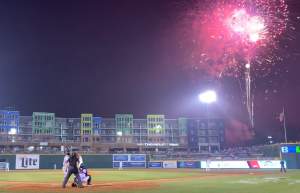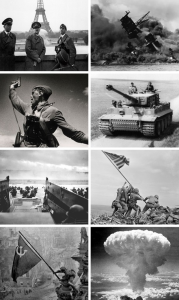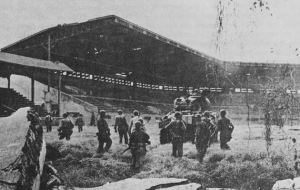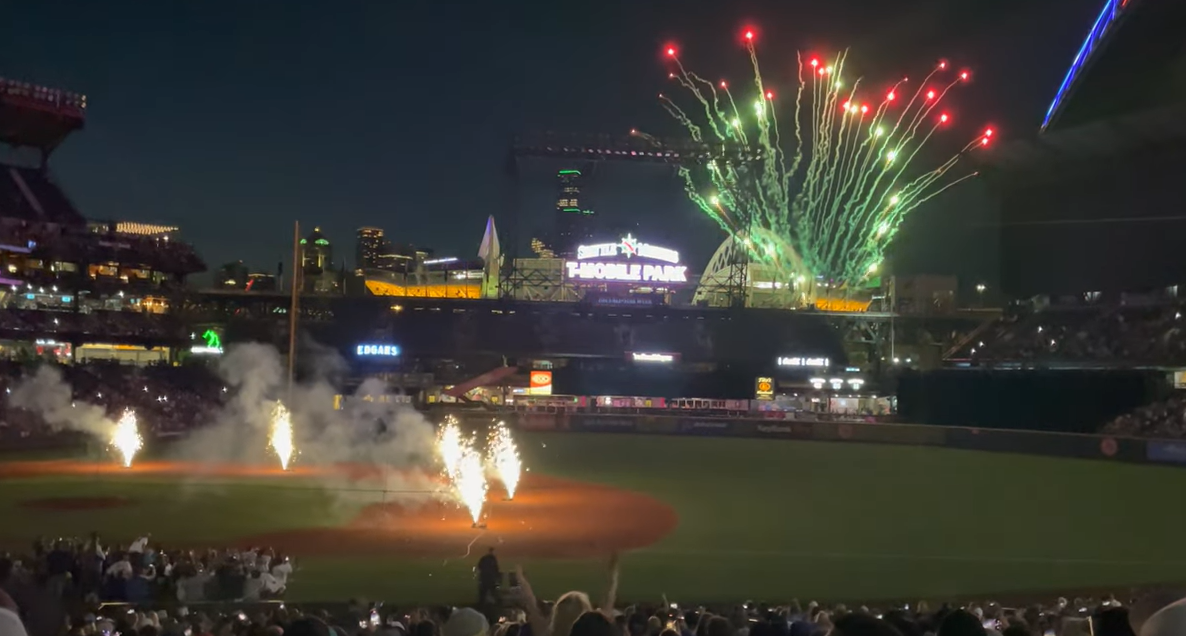Russell Vandenbroucke\PeaceVoice,
Photos: Wikimedia Commons\YouTube Screenshots
Responding to the announcer’s familiar, “ladies and gentlemen, boys and girls, please rise for our national anthem,” I stood at a recent baseball game, but Francis Scott Key’s lyrics transported me from the cheerful families around me to distant families, similarly innocent and civilian, besieged in Ukraine and Gaza.

Two centuries have passed since Key scribbled his impromptu poem on the back of an envelope amidst a war the United States had declared on Britain. Since then, our home front has been spared “the rocket’s red glare” with two exceptions: when President Polk provoked war with Mexico from 1846-1848 and when blood from the Civil War soaked American soil. That marked the last time a military foe spoke our language.
Key wrote his poem after witnessing the British navy attack Fort McHenry from Baltimore’s harbor. One military force battled another’s fortification while non-combatants, like Key, were safe outside the battle lines. How quaint. Today, the slaughter of civilians fills news reports. These casualties metastasize daily in faraway places that are hard to pronounce, spell, and keep separate from one another. Examples include:
· In Ukraine: Dnipro, Mariupol, Bucha, and Okhmatdyt, the country’s largest children’s hospital;
· In Israel: Be’eri and nearby kibbutzim, Sderot, Ofakim, the Sukkot music festival;
· In Gaza: Jabalia refugee camp, Khan Younis, Beit Hanoun schools, al-Shifa hospital, World Central Kitchen;
· In Lebanon, Israel’s Galilee, and the Occupied Territories: Palestinians killed by soldiers and settlers, Shomera and Kibbutz Dafna struck by Hezbollah and Hamas rockets and drones, Burj al-Muluk and nearby Lebanese villages similarly assaulted by Israel.
As usual, each side wraps itself in the certainty—and flimsy security—of self-righteousness. Doing so, they confirm Montaigne’s observation that “each man calls barbarism whatever is not his own practice.” The French philosopher wrote that four decades before Pilgrims touched Plymouth Rock.
I wish I could “other” Russians and Ukrainians, Israelis and Palestinians, Hamas and Hezbollah by believing they constitute a different species from my ballpark compatriots. But I can’t convince myself as I recall too many occasions when my nation bombed cities and villages. Those civilian deaths, like today’s, should not be dismissed as collateral damage when they were intentional, “justified” by the familiar presumption that noble ends justify heinous means.

In February 1945, we joined Britain in destroying Dresden across five nights that killed an estimated 25,000 residents, fewer than the 30,000 killed by the Luftwaffe’s eight-month Blitz on Britain.
A month later our napalm, invented by Harvard chemists, incinerated Tokyo in a single night. Victims of what is often called “the most destructive bombing in human history” included 80,000-100,000 dead, one million homeless, and up to another million injured. Thomas R. Searle writes in The Journal of Military History, “Japanese civilian casualties were not accidental or incidental, but an explicit goal.”
Key immortalized bombs “bursting in air,” but that isn’t where they usually detonate. Rather, they explode on impact with a target, or the ground, or far beneath it through “bunker busters,” which didn’t exist in his day. Nor had arsenals back then stockpiled intercontinental missiles that transformed measurements of the Earth’s geography from miles to minutes: warheads need about 30 minutes to cover our 5600 miles from Ukraine or 6700 from Gaza; North Korea, 6200 miles away, is 30 minutes near.
Technical and scientific “progress” led to new bombs using fissile material: uranium for Hiroshima, plutonium for Nagasaki. “Bursting in air” applied to both—more than 1500 feet above ground—to maximize their effects.
On this balmy night, an hour or so before the twilight’s last gleaming, I am probably the only fan contemplating these not-so-distant lands. But at this recent incarnation of our pastime, the national anthem leads me to recall America’s past times.

Russell Vandenbroucke, syndicated by PeaceVoice, is professor emeritus of theatre at the University of Louisville, where he was Founding Director of its Peace, Justice & Conflict Transformation Program. His Oppenheimer’s Atomic Bombers will be published by Broadway Play Publishing this fall.





